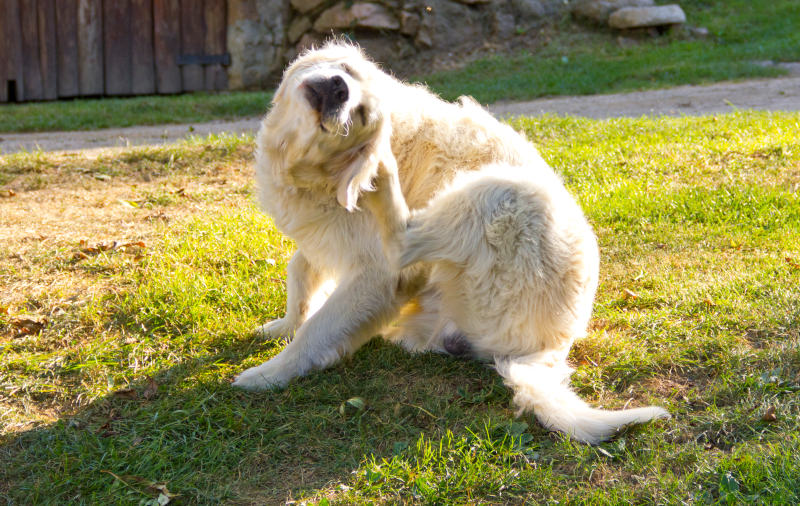“I love Golden Retriever’s personality and want one as our family pet, but my husband is allergic to dogs and doesn’t want to deal with the hair. Are Golden Retriever hypoallergenic?”
Our team received this question a few days ago. After all, it’s hard to enjoy your pet’s company when your nose is runny, your skin itches, and you are constantly sneezing. Some people, however, still want a pup even when suffering from serious allergies. That’s when they seek anti-allergy medications or add a “hypoallergenic” breed to their household.
So, are Golden Retrievers a suitable breed for an allergy-prone family? We know many people have the same concern – that’s why we publish this article! Read until the end to find out the answer.
Are Golden Retrievers Hypoallergenic?

Definition of “Hypoallergenic Dogs”
The term “hypoallergenic” when applied to dogs is often misunderstood. Contrary to popular belief, there is no such thing as a hypoallergenic golden retriever or a completely hypoallergenic dog breed. All dogs produce allergens to some degree, but some breeds are considered more suitable for allergy sufferers due to their lower allergen production or shedding patterns.
Causes of Dog Allergies
Dog allergies are mainly caused by proteins found in a dog’s body. The key sources of these proteins include:
- Dander: These are tiny flakes of dead skin that dogs shed.
- Saliva: When dogs groom themselves, their saliva can spread onto their fur and skin.
- Urine: Proteins in dog urine can also contribute to allergic reactions.
These proteins can become airborne or cling to surfaces, leading to allergic reactions in people who are sensitive to them.
Assessing the Allergy Potential of Golden Retrievers
Golden Retrievers are not considered hypoallergenic. They have a dense double coat that sheds moderately throughout the year and heavily during shedding seasons. This shedding contributes to the spread of allergens in the environment.
| Characteristic | Golden Retriever | Hypoallergenic Breed (e.g., Poodle) |
| Coat Type | Dense double coat | Single coat, low-shedding |
| Shedding Level | Moderate to high | Low |
| Dander Production | Moderate | Low |
| Allergen Spread | High | Low |
What protein causes allergies to Golden Retrievers?

Common Allergy-Causing Proteins in Dogs
The primary allergen in dogs is a protein called Can f 1, which is found in high concentrations in dog saliva and dander. Other allergenic proteins include Can f 2, Can f 3, and Can f 4.
Characteristics of Proteins in Golden Retriever Fur
Golden Retrievers produce these allergenic proteins in quantities similar to many other breeds. Their thick coats can trap and hold onto these proteins, potentially increasing allergen exposure.
Comparison with Other Dog Breeds
While Golden Retrievers are not considered hypoallergenic, they’re not necessarily worse for allergies than many other popular breeds. However, they do produce more allergens than breeds like Poodles or Bichon Frises, which are often recommended for allergy sufferers.
Read more >> Golden Retrievers Dying Younger: An In-Depth Look
Factors Affecting the Allergenic Potential of Golden Retrievers
Living Environment
The living environment of a Golden Retriever can significantly impact allergen levels in the home. Dogs that spend more time indoors tend to release more dander and shed hair, which can build up and lead to a higher allergen presence. On the other hand, dogs that are outdoors more often may bring fewer allergens inside since the open air helps to disperse and reduce these particles.
Grooming and Hygiene
Keeping a consistent grooming routine is key for managing allergens. Regular brushing can capture loose fur and dander before they spread around the house. Bathing your Golden Retriever frequently can also limit the accumulation of saliva and dander on their fur, which helps reduce allergens in the home. In addition, using air purifiers and vacuuming regularly can assist in keeping allergen levels under control indoors.
Immune System Sensitivity
Some individuals might have strong allergic responses, while others may only experience mild or no symptoms at all. Genetics, pre-existing allergies, and the condition of one’s immune system all play a role in determining how a person reacts to allergens from Golden Retrievers. Understanding these sensitivities allows potential pet owners to make informed choices.
Read more >> How Long Are Golden Retrievers Pregnant: A Complete Guide
How to Minimize Allergies When Owning a Golden Retriever

For those determined to own a Golden Retriever despite allergies, several strategies can help minimize reactions:
Regular Grooming and Fur Care
- Brush your Golden Retriever outdoors daily to remove loose fur and dander
- Bathe your dog weekly with a hypoallergenic shampoo
- Consider professional grooming services monthly
Vacuum and Clean Frequently
According to allergist Sandra Hong, the ideal environment for people with pet allergies should be carpet-free since it’s simpler to clean hard surfaces. She suggests mopping the floor with a damp cloth regularly to keep it as clean as possible.
In case you don’t want to get rid of your carpets, a vacuum will come in handy. In fact, vacuuming with a high-efficiency particulate air cleaner is a convenient way to get dog hair out of your space.
Get an Air Filter
Practical advice from most pet owners, if you are allergic to a dog, is to get yourself an air filter. This device reduces the spread and exposure to certain proteins in dog hair, which are proven to cause allergic reactions. Place an air filter in areas where you spend a lot of time, such as a bedroom or workspace.
Allergy Testing and Management
Methods for Testing Dog Allergies
If you think you might have a dog allergy, there are several testing methods to consider:
- Skin Prick Test: This test involves placing small amounts of allergens on your skin and pricking the surface to see if a reaction occurs. It’s a quick way to identify specific allergens.
- Blood Test (Specific IgE Test): A blood test measures the level of specific antibodies (IgE) in response to dog allergens. This test can help determine your sensitivity to particular proteins.
- Intradermal Skin Testing: Similar to the skin prick test, this method involves injecting allergens just beneath the skin’s surface. It can provide more detailed information about your allergies.
Consulting with Veterinarians and Dermatologists
Work with both a veterinarian and an allergist or dermatologist to develop a comprehensive management plan. This may include:
- Immunotherapy (Allergy Shots): Gradually desensitizes your immune system to allergens over time.
- Antihistamines or Other Allergy Medications: Helps relieve symptoms associated with allergic reactions.
- Environmental Modifications: Changes to your living space, such as increased cleaning or air purification, can reduce allergen exposure.
Allergy Treatment Options
| Treatment | Description | Effectiveness |
| Immunotherapy | Gradual exposure to allergens to build tolerance | High, but time-consuming |
| Antihistamines | Reduce allergy symptoms | Moderate, temporary relief |
| Nasal Corticosteroids | Reduce inflammation in nasal passages | High for nasal symptoms |
| Environmental Control | Reducing allergen exposure through cleaning and air filtration | Variable, but important |
Conclusion
So, are Golden Retrievers hypoallergenic? The answer, unfortunately, is no. Although this breed may not be ideal for allergy sufferers, you can still live in harmony with your furry friend if you know what triggers the allergy, have strategies to avoid the allergen, and get in touch with doctors when necessary.
A lovely Golden Retriever will bring a lot of joy to your home, but this joy shouldn’t be obtained at the expense of health or welfare. If you or your family members are allergy sufferers, here is our advice: Think twice, and consider carefully before adopting this majestic dog.

With years of expertise as a pet care writer, I’ve acquired a specific interest in Golden Retrievers, who are one of the most popular and beloved dog breeds. Although I do not own a Golden Retriever, my extensive study and talks with pet professionals enable me to offer useful and reliable articles for dog owners. My work on this website covers important areas such as diet, grooming, and training for Golden Retrievers. My goal is to provide readers with the information they need to keep their dogs healthy and happy.

